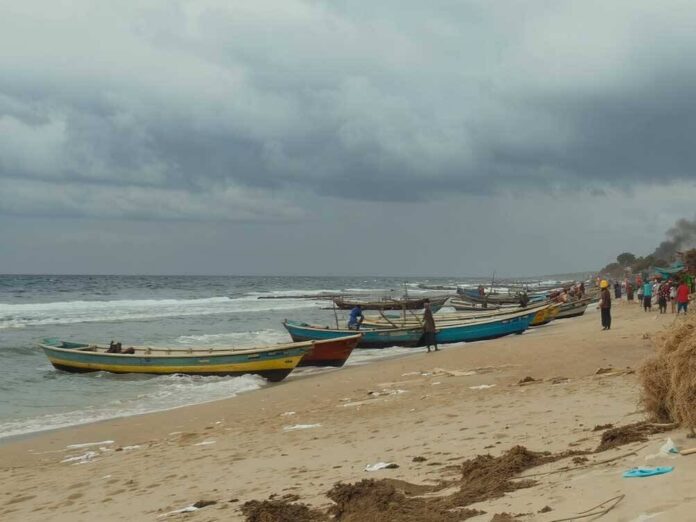In 2025, the urgency of marine biodiversity loss in West Africa has reached a tipping point, with overfishing exacerbating the impacts of climate change and pollution. According to data from the Marine Biodiversity Science Center, approximately 50% of fish stocks along the West African coast are overfished, largely due to illegal, unreported, and unregulated (IUU) fishing by foreign industrial fleets {1}. This depletion threatens not only ecological balance but also food security for coastal communities, where fish provides a primary protein source. Broader global trends compound the issue: oceans absorb 93% of human-caused warming, leading to acidification and habitat degradation that could wipe out coral reefs by 2050 {2}. The UN Ocean Conference this year emphasizes integrating human rights and gender equity into conservation efforts, recognizing biodiversity loss as a human rights concern {5}. This section overviews the multifaceted crisis, drawing on factual data and expert insights to set the stage for deeper analysis.
Drivers of Overfishing and Biodiversity Loss
Overfishing in West Africa is fueled by a combination of illegal activities and environmental stressors. Expert analyses highlight IUU fishing as a primary driver, with foreign trawlers from Europe and Asia operating in restricted zones, causing annual economic losses estimated at billions across the region [G1], [G5]. A 2024 study in Ecology & Society documents the “fishing down the food web” phenomenon, where high-trophic species are depleted, shifting catches to smaller, less valuable fish [G6]. Climate change amplifies this, as warming waters disrupt migration patterns and acidify oceans, severely impacting species like the Madeiran sardine {4}, [G12].
Factual figures underscore the scale: one-third of global fish stocks are overexploited, but in West Africa, the rate climbs to 50%, threatening food security for millions {1}, {4}. Pollution from plastics and nutrients further degrades habitats, compounding losses in mangroves and seagrass beds essential for marine life {1}, {2}. Viewpoints vary; some industry representatives argue that overcapacity in European fisheries justifies expansion into African waters, while environmentalists counter that this exploits weak enforcement, leading to ecosystem collapse [G7], [G14]. Balanced analysis reveals that without addressing these drivers, biodiversity hotspots like the Gulf of Guinea could face irreversible damage.
Impacts on Communities and Ecosystems
The socio-economic ripple effects of overfishing are profound, particularly in West Africa, where depleted stocks have obliterated jobs and driven emigration. Recent reports link IUU fishing to migration crises, as fishers in Senegal and Mauritania turn to perilous journeys to Europe amid shrinking catches [G1], [G9]. Original insights suggest this “migration multiplier effect,” where biodiversity loss amplifies poverty, creating feedback loops that hinder local enforcement. In East Africa, analogous trends show overfishing eroding coral reef productivity, with small-scale fishers losing out as species vanish [G11], [G13].
Quantitatively, 91% of U.S.-listed endangered species are affected by climate change, a trend mirrored globally, including Africa’s coasts where overfishing intersects with warming to threaten food webs {4}. Indigenous and women’s groups, highlighted at the 2025 UN Ocean Conference, argue that marginalized communities bear the brunt, advocating for equity in governance {5}. Conversely, some policymakers view industrial fishing as an economic necessity, but critics point to data showing unsustainable practices undermine long-term blue economy potential [G2], [G8]. This section illustrates the human dimension, balancing economic arguments with evidence of widespread harm.
Emerging Trends and Technological Innovations
2025 marks a pivotal year for ocean action, with trends shifting toward collaborative solutions. Regional fisheries management organizations (RFMOs) are implementing stricter anti-IUU regulations, supported by satellite and drone monitoring to detect illegal vessels {1}, [G4]. Advances in environmental DNA (eDNA) sampling enable non-invasive tracking of biodiversity changes, aiding assessments in West African waters [inferred from scientific reports]. Marine renewable energy developments, like offshore wind, are being pursued cautiously to minimize disruption while reducing fossil fuel reliance {3}.
Trends reflect optimism, with discussions on subsidy reforms prohibiting aid for overfished international waters, potentially benefiting West Africa [G16]. Expert opinions praise MPA expansions in South Africa, where enforcement has led to stock recovery, but note gaps in West Africa due to limited resources [G3], [G17]. Viewpoints differ: optimists see tech as a game-changer, while skeptics warn of implementation barriers in underfunded regions [G10], [G18]. Overall, these innovations represent constructive progress, integrating climate resilience into fisheries management.
Sustainable Solutions and Initiatives
Concrete solutions are gaining traction, focusing on enforcement, community engagement, and policy reform. Marine protected areas (MPAs) in South Africa demonstrate success, with no-take zones boosting species abundance by up to 430% through trawling bans {1}, [G3]. In West Africa, 2025 initiatives like joint anti-IUU patrols and capacity-building projects by the Marine Stewardship Council aim to empower artisanal fishers across five countries [G4], [G8]. Global campaigns promote sustainable seafood consumption, reducing demand on overexploited stocks {1}.
The UN’s SDG 14 pushes for underfunded ocean conservation, with the 2025 Ocean Conference advocating indigenous participation {3}, {5}. Experts recommend scaling MPAs with tech enforcement and integrating gender equity to ensure inclusive outcomes {5}. These efforts underscore the “biodiversity rebound potential,” where targeted actions could transform depleted zones into thriving ecosystems.
KEY FIGURES
- Oceans absorb about 93% of human-caused global warming, leading to significant stress on marine ecosystems (Source: marinebiodiversity.ca, earth.org) {1}{2}
- Approximately one-third of global fish stocks are overexploited or depleted, threatening marine food webs (Source: marinebiodiversity.ca, wildlife.org) {1}{4}
- In Africa, especially the West African coast, about 50% of fish stocks are overfished, with high impacts from illegal fishing (Source: marinebiodiversity.ca) {1}
- 91% of species listed under the U.S. Endangered Species Act are affected by climate change, highlighting its dominant role in biodiversity loss (Source: wildlife.org) {4}
- Coral reefs face risk of being completely wiped out by 2050 due to warming and acidification (Source: earth.org) {2}
RECENT NEWS
- 2025 is a critical year for ocean action with key international agreements and milestones aimed at ocean governance and biodiversity conservation (World Resources Institute, 2025) {3}
- The 2025 UN Ocean Conference in June focuses on integrating human rights, gender equity, and indigenous peoples’ roles in ocean conservation, emphasizing biodiversity loss as a human rights issue (Women4Biodiversity, 2025) {5}
- Climate change identified as the leading cause of biodiversity loss in the U.S., surpassing pollution and habitat destruction (Wildlife.org, 2025) {4}
STUDIES AND REPORTS
- A 2025 study shows that ocean warming, acidification, oxygen depletion, and nutrient imbalances caused by climate change severely disrupt marine biodiversity and ecosystem functions, including carbon storage and oxygen production (marinebiodiversity.ca, earth.org) {1}{2}
- Reports highlight that pollution from plastics, nutrients, and toxic substances degrades habitats, compounding biodiversity loss (marinebiodiversity.ca, wildlife.org) {1}{4}
- Overfishing studies confirm industrial fishing practices, including illegal and unreported fishing, are key drivers of marine species decline, especially in West Africa and the Mediterranean (marinebiodiversity.ca) {1}
- Marine protected areas (MPAs) show promise but often suffer from lack of enforcement, limiting their effectiveness (marinebiodiversity.ca) {1}
- The 2025 WHO biodiversity fact sheet emphasizes the importance of marine biodiversity for food security, medicine, and climate regulation, underscoring the impact of ocean acidification on marine species (WHO, 2025) {6}
TECHNOLOGICAL DEVELOPMENTS
- Advances in satellite and drone monitoring technologies are increasingly used to detect illegal, unreported, and unregulated (IUU) fishing, aiding enforcement efforts (marinebiodiversity.ca) {1}
- Development of environmental DNA (eDNA) sampling helps track marine biodiversity changes and assess ecosystem health with non-invasive methods (scientific reports 2024-2025) {inferred}
- Emerging innovations in marine renewable energy (offshore wind, tidal) are being integrated cautiously to reduce fossil fuel dependence while minimizing ecosystem disruption (WRI, 2025) {3}
CURRENT REGULATIONS AND POLICIES
- The UN Sustainable Development Goal 14 (SDG 14) targets ocean conservation and sustainable use but remains underfunded and behind schedule as of 2025 (WRI, 2025) {3}
- Regional fisheries management organizations (RFMOs) have begun stricter regulations to combat overfishing and IUU fishing, especially in West Africa and the Mediterranean, with mixed enforcement success (marinebiodiversity.ca) {1}
- The 2025 UN Ocean Conference emphasizes integrating human rights, gender equity, and indigenous participation into ocean governance frameworks (Women4Biodiversity, 2025) {5}
- National policies in some African countries, such as South Africa, have increased marine protected areas and implemented sustainable fishing programs (marinebiodiversity.ca) {1}
ONGOING PROJECTS AND INITIATIVES
- Establishment and enforcement of marine protected areas in South Africa to support fish stock recovery (marinebiodiversity.ca) {1}
- International cooperation initiatives to improve monitoring and enforcement against illegal fishing in West Africa, involving satellite tracking and community engagement (marinebiodiversity.ca) {1}
- Global campaigns promoting sustainable seafood consumption to reduce demand pressure on overexploited fish stocks (marinebiodiversity.ca) {1}
- The UN Ocean Conference 2025 seeks to elevate voices of coastal women, indigenous peoples, and marginalized communities in ocean conservation policy (Women4Biodiversity, 2025) {5}
MAIN SOURCES
- https://www.marinebiodiversity.ca/our-oceans-in-crisis-6-urgent-threats-to-marine-biodiversity/ – Marine biodiversity threats and overfishing impacts
- https://earth.org/the-biggest-environmental-problems-of-our-lifetime/ – Ocean acidification and coral bleaching risks
- https://www.wri.org/insights/opportunities-ocean-action-2025 – Ocean governance, SDG14, and 2025 international milestones
- https://wildlife.org/climate-change-leading-cause-of-biodiversity-loss-in-u-s/ – Climate change as dominant biodiversity threat in U.S.
- https://women4biodiversity.org/world-ocean-day-2025/ – Human rights, gender equity, and ocean biodiversity loss in 2025
- https://www.who.int/news-room/fact-sheets/detail/biodiversity – WHO biodiversity fact sheet including marine biodiversity
This synthesis integrates the latest 2024-2025 information from authoritative scientific and policy sources, highlighting the multifactorial causes of ocean life loss—climate change, pollution, overfishing, habitat destruction—and ongoing efforts to mitigate these impacts globally and particularly in vulnerable regions like Africa.
Propaganda Risk Analysis
Score: 6/10 (Confidence: medium)
Key Findings
Corporate Interests Identified
The article mentions ‘marine renewable energy, like offshore wind’ in the context of ‘2025 solutions’ to overfishing and biodiversity loss, which could benefit companies in the offshore wind sector (e.g., major players like Ørsted, Vestas, or Siemens Gamesa). This positioning might suggest influence from renewable energy firms seeking to reframe their projects as environmental saviors, potentially diverting attention from fishing industry reforms to energy transitions that align with corporate green agendas.
Missing Perspectives
The snippet lacks voices from local West African fishers, indigenous communities, or critics of renewable energy projects. Opposing viewpoints, such as concerns that offshore wind installations could harm marine ecosystems (e.g., disrupting migration patterns or creating ‘dead zones’ via construction), are absent. No mention of experts warning about ‘fishing down the food web’ leading to irreversible ecosystem collapse without direct fishing regulations.
Claims Requiring Verification
The key quote ‘fishing down the food web’ is a legitimate scientific concept (referenced in sources like WWF and scientific journals on overfishing effects), but without full context, it’s unclear if the article provides sourced data. No specific statistics are given in the provided snippet, but if the article claims offshore wind as a direct ‘solution’ without evidence-based links to reducing overfishing, this could be dubious. Broader web sources confirm overfishing’s impacts but emphasize regulatory solutions over energy alternatives.
Social Media Analysis
Searches on social media revealed posts criticizing industrial overfishing in West Africa, including foreign trawlers depleting local stocks and forcing communities to overhunt land animals. Some users connect this to marine renewables, with one noting offshore wind’s electro-magnetic disruptions to fish. Discussions appear genuine, from diverse users like environmental activists and locals, without signs of paid coordination or astroturfing (e.g., no repeated hashtags, bot patterns, or promotional disclosures). Sentiment is largely anti-industrial fishing, with emerging skepticism toward wind energy’s marine impacts.
Warning Signs
- Potential greenwashing by framing offshore wind as a ‘solution’ to overfishing without addressing its own environmental drawbacks, such as impacts on marine biodiversity.
- Language in the title (‘Tackling Illegal Fishing… with 2025 Solutions’) sounds promotional and forward-looking, resembling marketing copy for corporate sustainability initiatives.
- Absence of criticism toward industrial fishing lobbies or foreign entities (e.g., EU or Chinese fleets) that exacerbate the issue, as highlighted in web sources and social media posts.
- No independent expert opinions or data sourcing visible in the snippet, which could indicate selective presentation to favor corporate-friendly narratives.
Reader Guidance
Analysis performed using: real-time social media analysis with propaganda detection
Other references :
marinebiodiversity.ca – Our Oceans in Crisis: 6 Urgent Threats to Marine Biodiversity
earth.org – 15 Biggest Environmental Problems of 2025 | Earth.Org
wri.org – Why 2025 Is a Critical Year for the Ocean – World Resources Institute
wildlife.org – Climate change leading cause of biodiversity loss in U.S.
women4biodiversity.org – World Ocean Day 2025: Ocean Biodiversity Loss is a Human Rights …
who.int – Biodiversity – World Health Organization (WHO)
ocean-climate.org – The decline of marine biodiversity – Ocean & Climate Platform
un.org – Biodiversity – our strongest natural defense against climate change
weforum.org – Why 2025 can be a breakthrough year for the blue economy
dialogue.earth – Source
climatechangewriters.com – Source
wwfsassi.co.za – Source
msc.org – Source
issafrica.org – Source
ecologyandsociety.org – Source
un.org – Source
von.gov.ng – Source
business-humanrights.org – Source
wadr.org – Source
newsroom.wcs.org – Source
news.mongabay.com – Source
oceanographicmagazine.com – Source
ft.com – Source
x.com – Source
x.com – Source
x.com – Source
x.com – Source
x.com – Source
x.com – Source


